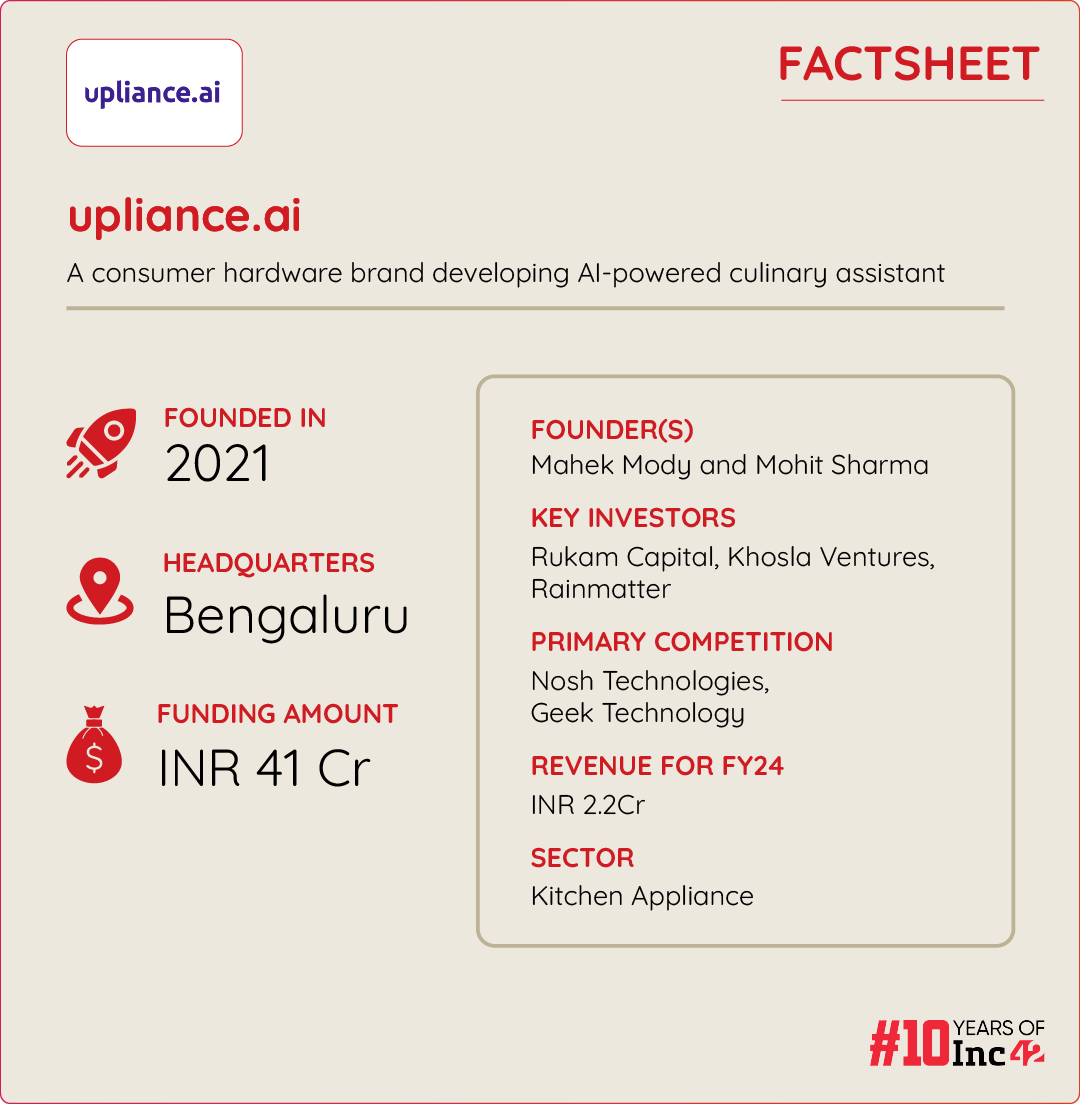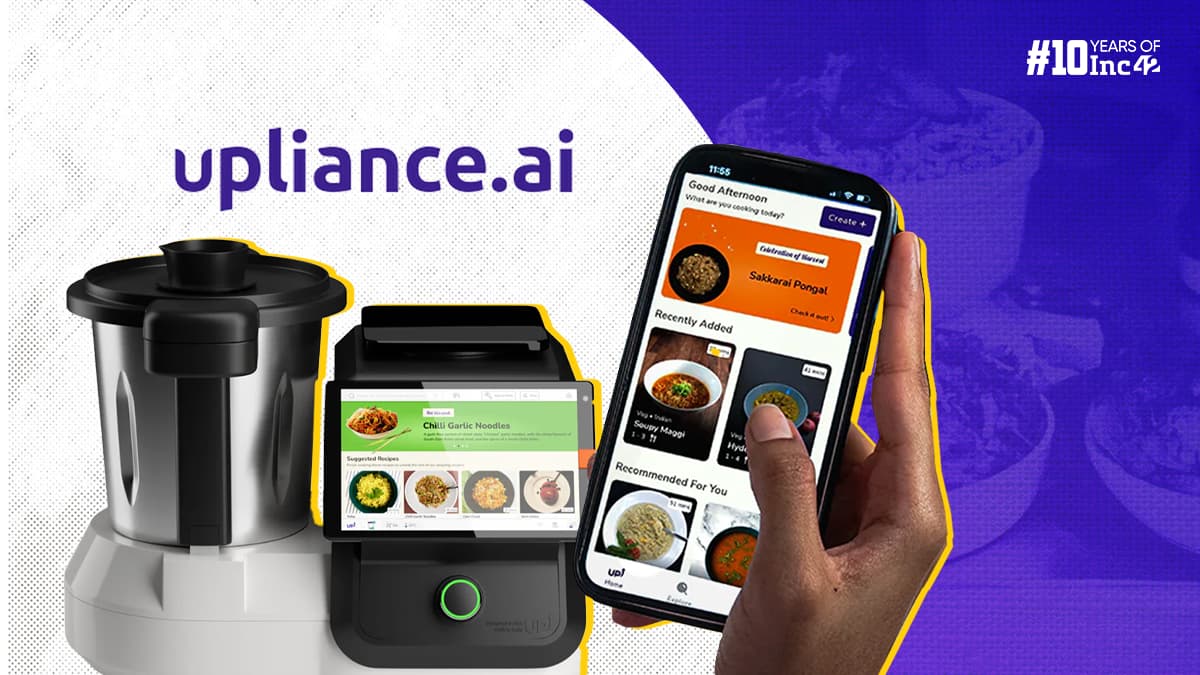The world has leapfrogged into a new era of innovation where AI-GenAI is transforming almost every industry and creeping into our everyday lives. Smart homes run by connected devices are no longer a classic science fiction trope. But the Indian kitchen, a treasure trove of flavourful recipes and intricate culinary arts, has escaped the technology takeover for a long time.
Although ghar ka khana (home-cooked food) is a coveted option across generations, not everyone is a great cook and lacks the skill to rustle up a delicious meal after a long and busy day. As for those in love with fancy cuisines (one can find plenty of those on Insta reels), fine dining every day may not be a viable option as it hurts health and budget.
IIT-Mumbai alumni Mahek Mody and Mohit Sharma witnessed these cooking woes first-hand. They began to wonder if the versatility of AI could be used to help time-strapped individuals or novice cooks prepare meals without the hassles of traditional cooking. The duo set up upliance.ai and made waves when they launched personal cooking assistant, an AI-powered culinary assistant that ensures cooking at home will be fast and fun for the novice and the experienced alike.
Their flagship is a personal cooking assistant ‘Upliance’, especially designed to produce the flavours and textures of Indian cuisine. It offers 500+ pre-loaded recipes across five key categories (further searchable by meal type, ingredients available in your refrigerator and cooking time) and automates 16 cooking functions, from portioning, chopping and mixing to sautéing, stirring and making a full meal for four or fewer people.
The appliance comes with a smart jar equipped with a patented omni blade that can double up as a spatula or a blender and multiple sensors for thermal and precise blade motion control. Along with the jar comes an eight-inch touchscreen for recipe display and video cooking instructions, as well as several cooking accessories. For smooth functioning, a user needs a 5G internet/Wi-Fi connection and an uninterrupted power supply.
If this sounds like a super-smart microwave with advanced features, here’s more. Powered by inputs from home cooks, chefs and influencers/contributors, upliance has developed and integrated a generative AI feature ‘Up⤴️AI to set up a recipe generator, bringing more variety to the pre-loaded menu. It can also modify and customise existing recipes to suit dietary and personal preferences.
“We have collected data from 20K+ user queries and currently have close to around 5K customers. This has helped us train the recipe generative AI module and introduce a recent feature where one can submit a few ingredients via voice and get a customised recipe within three minutes. Users can also ask the GenAI chatbot questions in 17 Indian languages,” said Mody.
“The recipes thus generated are not just standard cooking instructions. Each one is fine-tuned to sync with the system’s unique features, existing recipes and user preferences. This adaptive technology ensures that each dish is perfectly cooked and keeps track of user preferences to expand offerings,” he added.
The cooking assistant is sold on the upliance.ai website, major marketplaces like Amazon India and offline stores located in Mumbai and Bengaluru. So far, the startup has sold 4K+ units, mostly B2C transactions. It has clocked INR 2.2 Cr in revenue for FY24 and is eyeing multifold growth in FY25, that is, INR 22 Cr.
The startup has raised INR 41 Cr from a clutch of noted investors, including Khosla Ventures, Draper Associates, Rukam Capital, Nikhil Kamath-led Rainmatter Fund, Stanford Angels and Entrepreneurs India, as well as undisclosed cofounders of Ather Energy and Unacademy.


Five Unique Features That Make upliance.ai Stand Out
The founders of upliance.ai are trained engineers, and their work experience has helped them hone their skills further. Before launching the startup, Mody served as a product manager and later as chief of staff in the CEO’s office at Ather Energy. Sharma was a senior director at Chaayos and led the engineering team. As a result, both were deeply aware of the growing relevance of advanced technology in ‘Made in India’ consumer hardware space and the kitchen appliance segment, in particular.
“Young India has different requirements than what it had 25 years ago. Consumer products today not only help people by reducing physical effort but are looking for products that give peace of mind and enhanced experiences. The technology landscape should reflect that shift, but that’s not happening everywhere. We wanted to bridge that gap when we entered this market,” said Mody.
There were considerable challenges in attaining those goals. However, upliance.ai came up with five distinctive strategies to tackle them. Here is a quick look.
Launching a market-ready Product with off-the-shelf hardware: The biggest challenge was avoiding heavy investments upfront for development and manufacturing. The startup solved the problem by using as many off-the-shelf hardware components as possible that have proven durability and quality and used third-party manufacturing in Bengaluru, although the product was designed in-house. It also used modern techniques like 3D printing, laser cutting and waterjet cutting for machine parts fabrication to reduce production costs. The key IP lies in the electronics, firmware and software that the team builds inhouse, allowing the hardware to perform functions it earlier could not do
The founders rapidly tested the product for safety and usability and launched the system as soon as it was market-ready and worked on meaningful feedback from paying customers, through their AI-based technology. The first batch of 100 units was shipped with only 12 recipes and three cooking functions. As the product was enhanced over the time, older customers got the updates in recipes and cooking functions.
Seamless connectivity and adaptive innovation: Integrating a ChatGPT-like GenAI module has created an interactive recipe bank quite different from the online recipe databases. The founders also claim that their techniques and recipes evolve as they constantly train the algorithms based on user interactions.
“Some users prefer certain ingredients and make modifications, while others have dietary restrictions, some just do it for experiment. This led us to develop AI customisation, for example any recipe can be turned vegan or Satvik with AI,” said Mody.
There is another side to collaboration and connectivity. Although many people enjoy scrolling through food content on social media, they often lack the confidence to recreate complex dishes at home. So, upliance.ai encourages people to share those items via its app and the AI delivers that recipe to their Upliance device in three minutes. Users can also connect with a chef from the startup team, who will respond to their cooking queries in real time.
“The greater our recipe collection, the more the customer engagement, interactivity and product enhancement. Our collaboration with Google, Qualcomm and OpenAI has been instrumental in harnessing all these advancements,” said Mody.
Pre-sales live demo and a hassle-free return policy: Going digital-first is a given for any direct-to-consumer (D2C) brand, but upliance.ai has taken it up by several notches. Now, potential buyers can request live product demos on the website so that they can easily understand the technologies involved. Plus, there is a seven-day return policy, which allows one to try cooking several dishes within the first week of the purchase and return the product if unsatisfied with the results.
“We are now shipping pan-India, which makes this category-creating product available to anyone who wants to buy it,” said Mody.
Collaborations with chefs, recipe creators: The startup has not invested heavily in marketing, but that scenario is changing fast. Its goal is to increase product awareness and make the appliance more innovative. To broaden its market reach, the startup has partnered with more than 50 creators, including chefs, influencers and food bloggers/vloggers who share their personal recipes’ lists on the platform. In the next 12 months, the brand aims to be present in most Indian kitchens, significantly transforming everyday cooking.
Support from investors with a well-aligned vision: The startup announced a funding round from Rukam Capital and Khosla Ventures soon after it was featured in Shark Tank India season 3. Among its key backers, Rukam Capital has played a pivotal role in upliance’s growth journey by providing effective mentoring and networking opportunities.
“It is a unique startup that blends hardware and software in the [home] appliance space. Since our initial investment during their pre-launch phase, we have been committed to supporting them with product feedback, market strategy and strategic capital allocation,” observed Archana Jahagirdar, founder and managing partner at Rukam Capital.
The startup raised INR 3.5 Cr from Rukam Capital, a Delhi-based venture capital firm that invests in early-stage consumer products and services.
Will Smart Cooking Take A Seat At The Kitchen Table?
India’s love for all things food – traditional, fusion or gourmet offerings from across the globe – may soon witness a sweeping entry of smart cooking appliances. After all, effortless meal-making and experimenting with fusion foods are emerging as the new norm, flooding YouTube and Instagram with innovative culinary combinations.
Pasta infused with Indian spices, Korean-style dosas, vegan butter chicken and gulab jamun cheesecake are just a few examples of how urban Indians are exploring a diverse array of flavours. And who else can suggest how best to prep and make these novelties, if not the GenAI modules? True, there are YouTube videos to teach people these culinary skills. But it takes time to learn, and the hassles of traditional cooking – time, effort and the risk of the cooking going wrong – cannot be skipped unless AI-powered guidance is available.
The critical question is: Will India’s nascent market grow fast enough? If it does, are startups like upliance.ai, Nosh and Geek Technology well-positioned to ride India’s culinary revolution and kitchen tech adoption?
Globally, the smart kitchen appliances market is projected to reach a little over $84 Bn by 2031 from $20.9 Bn in 2024, at a healthy CAGR of 19%. In India, the overall smart appliances market volume is estimated to reach $4.3 Bn by 2028 from $3.1 Bn in 2024 at a CAGR of 9.1%. However, the integration of GenAI in one’s ovens, cookers and refrigerators will likely happen at a fast clip as big tech companies like GE Appliances, LG and Samsung are all set to delight new-age customers with their connected offerings.
In essence, this market will grow more demanding. Hence, upliance and its ilk must innovate more to cater to the time-constrained, convenience-first new-age consumers. The competition will be formidable, too, led by deep-pocketed MNCs and homegrown incumbents ready to invest in new growth segments.
In the future, kitchens may be run by intelligent, adaptive and personalised appliances. But will it become too mechanical to be fun, deterring people from large-scale adaption? Or will the art of traditional cooking die a natural death? Experts are not sure yet. Meanwhile, the likes of upliance are keen to strike a balance between tech assistance and human ingenuity. This middle path could be the best way ahead for those who love to cook and companies that want to reduce their chores.

